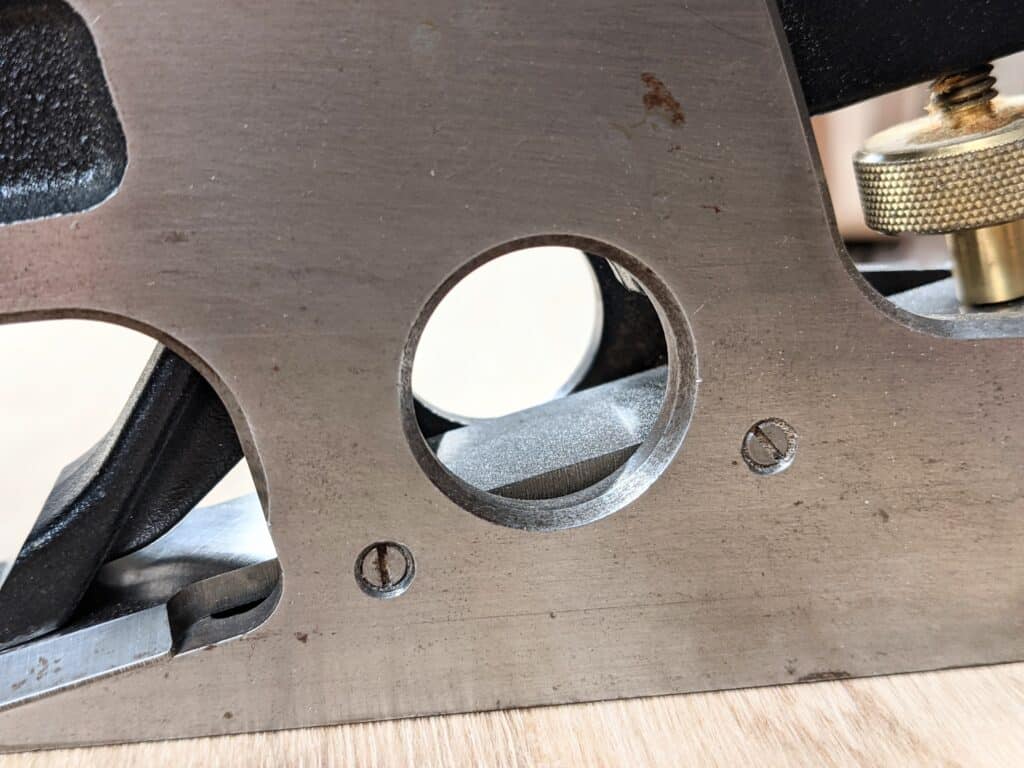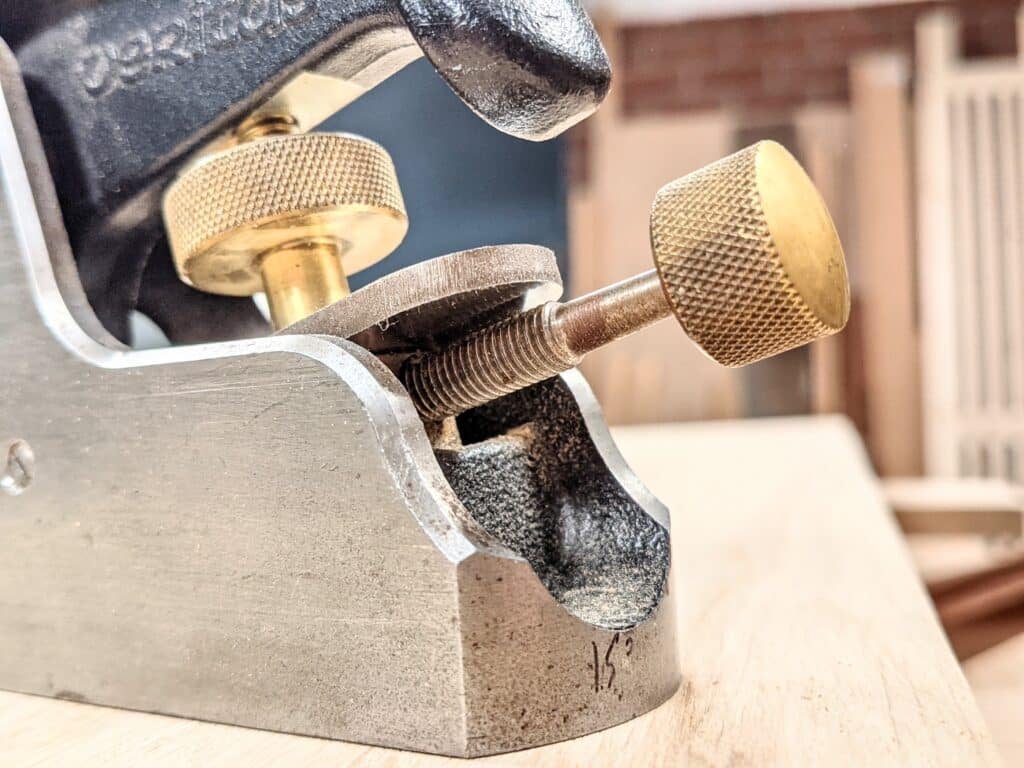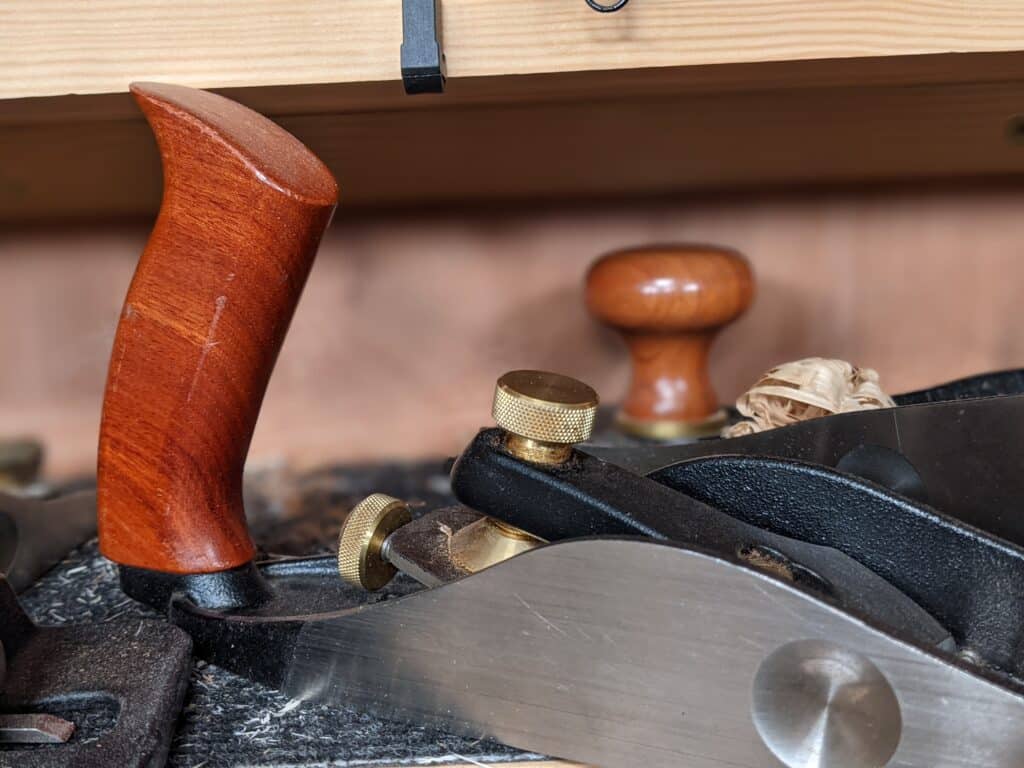Wellbeing and Woodworking
As it is in sporting worlds, wellbeing was hardly an issue 20 years ago, today, everyone uses the term for whatever realm they are in. We’ve learned through our first encounter with a pandemic about anxieties we never knew existed; loneliness and isolation, fear and its controlling influences and much more seem evermore present now. I’m sure that they always did, we just didn’t identify them, in the same way we didn’t identify many disabilities that were mental disabilities that are hidden from us. Wars and rumours of wars, the sudden death of a loved one all take their toll. That does not mean that wellbeing, being well and in good mental health, isn’t still always an issue for many if not most, just that it wasn’t talked about. Hearing all the more about it throughout the current Olympic games from athletes this year, and then in tennis at Wimbledon too, it made me think about the cultural shifts that not only exposed mental wellbeing as the responsibility of all but also the wellbeing of all disabled people who are all too often disabled by the abled and the disabled alike in differing measures. In some cases, I might cite the Olympics in this case, the stresses and anxiety causing a lapse in wellbeing might be as much self-inflicted as it might from external pressures. The Olympians I hear of supposedly do what they do for the love of the sport. In other words, it is a choice that they themselves chose to do. Nevertheless, when they found out that they were actually getting good and better at what they did, they were ‘promoted‘ to new ranks as competitors and then expected to run, skip and jump into the arena to get the golds for themselves and of course their countries. This rising-in-the-ranks elevation, whether by others or by self, changed the stakes for them. As amateurs, they had little to lose, as professionals — they suddenly had everything to lose. Five and ten years of training for one or two events became a must-have for them. Miss this opportunity and they might just be relegated to the ranks of the unknown has-beens. At some point, these emerging athletes were launched into a new and unknown future. A backing of expectation and sponsorship support soon followed and suddenly they were, well, owned by others. Before this point they were simply enjoying their sport on a day-to-day exercise program they set for themselves. Now, they were wearing the gear of sponsors and following the instructions of world-class coaches. In other words, it’s here that stress levels peaked and anxiety pressures were somewhat normalised for them as part of the day-to-day of life. The ultimate prize of a gold, glinted in the eyes of expected success. Some could handle it, some could not! The truth is that many want to be known to be a professional when the joy for many is never being the winner because in the realms of the amateur, the joy is simply in sharing the same distance run and completing as best they can in a time and pace that matches their strengths and abilities.

In my world of working wood, I am considered an expert and a professional — a master, if you will. In my world, I consider myself the ultimate amateur at the pinnacle of amateur status. I make because I can, because I am good at it and because I love it. On my shirt top there are no sponsor’s names (not even my own) and hovering in the background there are no sponsor names that I promote anywhere to increase my income or status. If you do see a name somewhere, it is not because I am promoting something I am compensated for by getting free tools, equipment or monetary gain, but something I simply choose to use at that minute. I do have the right to change that if I want to but I choose not to and it is unlikely that that will ever change. Why? I am almost certain that I could triple or quadruple my income by taking sponsorship. Of that, I have little doubt. Were I to pick up the phone and make a call or two, I am sure that I could find added security for my future. The problem is that it would cost me too much. I post this and all other posts because I choose to and I write whatever I want to as responsibly as possible because this too is important to me. You may well see me use a Veritas plane now and then. They don’t pay me to do that, I do it because, as far as planemakers go, they are one of the few that actually took a concept, revolutionised the minutiae to create a plane that had adjusters and adjustment tolerances that were highly beneficial and even designed plane elements that didn’t exist before.

Their engineering standards are about the best for a production plane and their prices are affordable even though some might balk at the price initially because to them it might seem to be prohibitively high. I like that the cutting irons can be installed, centred to suit, and then set with the two side setscrews to make repeat setups identically repeatable. I like that the quarter turn on the fine threads adjust by thousandths of an inch and that once done they are rock solid. On some planes, I find these features of great value. I also like the fact that, despite high demand, they maintain fair pricing for what are essentially lifetime tools. Had I plumbed for a Veritas plane at the start of my now 56 years of full-time daily woodworking, I would know that I need not buy parts or even a second iron in case I wore anything out or down. I have worn through three and a half Stanley plane irons since I began woodworking, even though I rarely if ever grind them on a mechanical grinder. Lee Valley Veritas has always been highly supportive of the work I do, but remotely. Would I change from my Stanley and Record planes to Veritas versions? Well, as it is with many things woodworking, it’s not really an either-or.

One of the things I enjoy the most about my woodworking and teaching and influencing the world I reach out to is the freedom to express myself and who I am, even when others have tried to bully me and silence the other intricacies of my life. For some, life comprises a diverse range of breaks, stages and phases in a day, a week, a month and so on. My workday starts when I wake and ends when I go to sleep. If I dig my garden, I am working, when I write a blog or film my efforts, I am working. If I take my fieldglasses to the lake I am working and if I clean or polish my shoes I am working. I do not split-divide my life-day off into recreational time, work time, family time and so on because all of my day is about recreation in the sense of re-creation, and by that I mean every minute. Were I to take sponsorship, I would be selling myself to the highest bidder and I would lose my freedom to be, well, who I am. This actually almost happened when I wrote my first published book. I chose to travel the US and promote woodworking classes and the lifestyle I lived through several states. The then publishers were profoundly offended because I didn’t promote their work and a conflict developed that was irreparable. The fact that my reason and purpose was completely different and that I chose to travel independently seemed not to count for anything. I also had no reference to my published work in any form on my website because at that time I just wanted a clean and clear website free of advertising. You see, even though I had no contract to the contrary, there was an overt expectation to do otherwise. I chose independence and I still do. Sponsorship, quite naturally and expectedly, brings with it much baggage. Any pressure I have is not for the financial increase and sales of others, even though others try to piggyback my website in different ways. One US company tries most days to infiltrate my comments section with messages under different names that seem to be from an individual rather than the commercial business it is. They create URLs to that end each and every time amd because I read every single comment as they come in, I detect them without using a spam blocker that would not detect these comments anyway, and I take them out by the second.

I love and live for the freedoms I have engineered as part of my lifestyle woodworking. I use a Dewalt drill-driver but would use a Makita just as readily had I bought one when I came back to live in the UK. I also use Stanley, Makita and other pieces for some of my work. My jigsaw is an ancient Makita, ten years old when I bought it ten years ago, that works perfectly. I have a Dewalt skilsaw and Makita 4″ belt sander none of which I depend on and I take no sponsorship from any of these big names and for good reason. FREEDOM MATTERS! I no longer use a chopsaw, the power planers are gone and so too the tablesaw. I don’t need them anymore and neither do the major part of my audience. Look at the dozens and hundreds of pieces we have made without much power equipment and without sponsorship. I love it! Well-being is a right of all and we must take care to keep it that way.


Professionalism has completely corrupted the very essence of sport.
I have heard of a mum who send her (10 year old?) child to a sport club for the fun and the health benefit. After a few attendance, the coach said to her that the child had not the level and should not come anymore. This of course because clubs “sell” the best ones to other clubs. Totally unacceptable. Even more unacceptable that those clubs receive subsidies paid by the tax payer as part of health policy. Hopefully, it seems the coach had to make back track.
I only do woodworking as gifts for relatives (and for me of course); no pressure here.
Hi Paul,
I have a question about your workbench design.
I’m writing here because the comments are disabled for the workbench post. Plus, I’m encouraged by the reference in this post above to your reading every single comment on the blog.
The design I’m referring to is the 2018 youtube video series. I’m now finishing the leg frames, and getting ready for assembly. This is so exciting! However there is something I’m uncertain about.
Here is what I’d like you to explain: when inserting the well board you say the two lag screws are pulling the top portion of the back apron inwards. You never talk about a corresponding pair of lag screws on the front apron. So what is pulling towards the well board from the front side? Is it necessary? For my inexperienced woodworking mind it seem like it is. Or perhaps there is no need for any counterpressure… Please explain.
The benchtop is subsequently fixed to the top of the leg frames after the inside top area of apron is glued and clamped to the fore edge of the benchtop to create an ‘L’. This is how it is strongly anchored perfectly well.
Thank you for your reply! It’s absolutely fantastic that I can count on your advice; thank you for all your hard work on bringing real wodworking to people!!!
Hi Paul, sage words. It is disappointing that comments are being infiltrated by business with an agenda. I totally respect your choices and so should that/those businesses. I have read your comments before about planes and in particular the weight and iron sizes and it seems pretty clear to me that a plane maker could work with you on a design. I am just starting out and once my workshop is up and running will subscribe to your paid channel, once I have mastered a few of the basic skills. I am looking forward to learning from my mistakes and learning. Access to your knowledge through your various channels is one of the more positive aspects of the internet! I have acquired a selection of planes, some new and one I shall be following your tutorial on for cleaning up and restoring (an old Stanley 4 1/2). I have always liked the Veritas tools and have a few I am looking forward to using. I have some Clifton’s too. I did buy a couple of Pax 20 ppi dovetail and tennon saws and was partly dismayed at how on Earth I was going to sharpen the teeth (magnifying glass will be required I think!).
I like your approach and it suits me. I am sure it doesn’t suit everyone, but you have a choice. I don’t need to work wood for a living and maybe that makes my choice easier. Wood is a phenomenal natural product which will stand the test of time.
I have started this for my own well-being: needing to find something I enjoy to balance my busy work life. Some sponsorship, if constructed right, could be beneficial, but it is your choice and yours alone. And I respect your choice.
Keep on delivering your pearls of wisdom and thank you for what you make available from your vast experience and knowledge.
I’m not very good at working with wood. But it is one of my joys and I always strive to become more comfortable with skills. This does not take from the peaceful and enriching experience of woodworking it just aids me to learn more and be more patient.
I’ve made many projects for my son and grandsons’ – saw sharpening vice, gun cleaning tool box and for my grandson a box to hold his cherished items and any cash he’s inclined to save. The items are for use and the process of creating them brings many hours of peace, fulfillment and a quiet mind. When I presented my grandson with one of my creations he looked at it carefully, ran his fingers over the soft wood and said “this looks store bought”
Your article brings a compassion to the plight of some…doing it for the love of it than becoming enslaved by it. But I wonder, Mr. Sellers, if we’ve succumb to an “ends justify the means” mentality to explain away the eroding of true well-being.
Good stuff, Paul. Your perspective resonates even more with me now as I grow older….and hopefully, more mature.
I’m surprised that commercial enterprises would try and influence you.
Doesn’t say much about their integrity.
At one time when I was young my brother and I made kitchens and structures as a side job.
I didn’t like woodworking or carpentry much doing that because it was subject to other peoples ideas of how things should be done. I was working two jobs and had no freedom at all.
I have never stopped making things but no longer do so just for money.
I’m always learning, that’s what makes it so enjoyable. The other day I turned a new spindle that was a replacement for a defective windsor chair, the manufacturer made a spindle to short and the arm was always wobbly. It was the first time I ever turned something to a specific shape to match other spindles. It took me two tries but the second one fit perfect! It took me an afternoon to do it, I’ll bet the next time I could do it in about an hour. The satisfaction in doing this type of thing (for me) is very gratifying. Not to mention I saved myself from buying replacement kitchen chairs.
Thanks Paul. I am grateful you haven’t taken on sponsors. I think it adds a level of genuineness to your advice because you paid your own money for something and are not beholden to anyone on your thoughts.
Having said that, I do understand why many on YouTube and the like take on sponsors and certainly don’t fault them (and I wouldn’t fault you if you ever did take on a sponsor). Given they are providing good content to me for free (I do watch the ads to help them though), they need to make a living somehow.
Thank you Paul for a wonderful and simple reality check, put clearly and effectively. It is a wonderful piece of advise that translates across. so many spectrums, yet maintains its integrity.
I’m retired. So, my wood working is for my family and and me. I’m also a rank amateur! Lol. I enjoy it so much though. Thank you
Hi Paul, How are the book revisions coming along? Looking forward to the new edition. Thanks
Thanks Paul, I enjoy your blogs and appreciate your knowledge of woodworking and associated hand tools. These messages have been a good guide to acquisitions for projects. I do find that going out to the shop is relaxing and sharpening , fettling, and puttering around with tools does this. My skills also improve and periodically I engage in a project. Currently, when his time allows, my son-in-law , is making a couple of picture frames from salvaged wood. I have introduced him to hand planes rebate , shoulder, and smoothing and this has been fun for both of us. Hopefully he will want to do more as it would be good for someone in the family to have an interest and also to have someone to pass my tools on to when the time is appropriate.
Great post, and it highlights a hobby horse of mine, the role of self-centeredness in our world. In some respects self-centeredness is critical to our well being, we need to know who we are.
I’m coming to the conclusion that there are three types of self-centeredness –
A focus on yourself so you can understand yourself. This absolutely critical but is a skill to be learned/practice.
A second form is self-centeredness that leads to the idea that “I deserve”. I watched a young kid learning to snow board. He’d get on the board and zoom out of control down the hill. Watching him getting increasingly angry it was clear that after watching the professionals he felt he deserved to be able to succeed. This is the sort of self-centeredness that I fight when I’m in the shop, I don’t deserve to work like Paul, I haven’t spent time as an apprentice nor 50+ years in practice and even if I practice, I may not succeed for a variety of reasons. Regardless, when I think I deserve something I stop and think.
The third form of self-centeredness is summed up by the thought that “I can contribute”. Paul has this down in spades, and it’s well stated in this and any number of other posts.
Given the urgency of the recently released climate report it’s very clear that we need to give up the “I deserve” mentality. I don’t deserve a car, but I think I do deserve community planning that makes walking/biking accusable. I don’t deserve the trappings of our 1st world economy.
So what do we deserve? Well asking that I got stumped. I’m not sure. Certainly we need health care, the ability to choose our own path and to derive some happiness along the way.
My two cents – we need to refocus our very beings and change our behavior from I deserve to I can contribute fast, or the climate will give out. A good start to an I can contribute would be to not buy nonessentials and to make (recycle) everything you can. Paul you keep reminding us that there are sensible ways to live that are environmentally sound and personally rewarding. THANKS
Great post Jay, I found it very interesting. Probably because I agree!
The problem with shifting from deserving to contributing is that our freedom to contribute is largely restricted. You’re point about community planning highlights this. I don’t have the freedom to grow my own food that would massively reduce my carbon footprint, I don’t have the freedom to cycle on the dangerous roads around where I stay, but must of all I don’t have freedom from a life of debt, I don’t have freedom from constantly being marketed at and I don’t have the freedom of time.
But I’m starting to sell the things I don’t need, like my power tools, the guitars I no longer play, the books I no longer read and the clothes I no longer wear. Then it’ll be the Netflix subscriptions, maybe a TV, the land rover I don’t drive and will never fix. All, hopefully, to be replaced with nothing. You’re right, I don’t deserve those things. They were just consumerism, packaged in a thin coating of ego (look at all my equioment!). Hopefully it won’t be too late!
Speaking of “Self Centeredness”, have you ever considered the pressure the UN’s IPCC places on scientists to “Produce” what is their agenda’s desired outcome? Otherwise grants dry up, reputations are besmirched (or worse) and lableing them as “The Other” goes on unabated. True “Science” is not about “Consensus”, it is about doubt, questioning and proof. When we start picking our favorite scientists, epidemiologists and others, to the exclusion of anything or one else, we’re engaging in “Tribalism” not clear thinking.
I don’t worry too much about sports any more. My not being in the marketing demographics may play a role in my attitude. I do gain satisfaction in a day that winds down with a look around the garage and a smile. I rarely put in a full day of woodworking. Interruptions (if you will) a granddaughter coming by for a visit with Mom, a grandson calling to ask when he can come over and help with the bees and make something with his tool kit. All good and welcome breaks. They make me realize life is worth living even if at a slower pace than when I was going to slay the world. The current benefits of a hug and a “I wuv you Pop” always brings a tear to my eye. A value well worth the effort.
Hi Paul,
I remember reading in a magazine(maybe 60 years ago) which related what happened when a new neighbour moved in.This guy was quite, and pottered along in his own way. One night a storm blow up and in the morning it had reeked havoc with many sheds and fences. Knowing that all the professionals would be chasing the big jobs he took his tools out with him and offered his services to the family next door. a few beers and sandwiches later they had repaired and re erected the fence and garden shed. Thanking his new neighbour he commented that that was a fine set of tools and what did he make with them to which the old guy replied, friends mostly. Its a rich man who has many true friends and no depts.
Thanks Paul.
My spouse works in ‘neuro-plasticity’, the brain that can change itself. Using your hands, especially creating with hand tools is so beneficial to our brains and well-being it ought to be considered essential.
As with many things, I am continuing my struggle to learn from and catch up with you. This includes my power tool ownership. I still own my tablesaw and a ‘big iron’ planer/jointer. That planer/jointer is a magnificently large beast that is admirable for its secondary ability to heat the whole shop in the winter.
But, there is nothing so satisfying as finding an ‘opportunity’ to use a handsaw or a Stanley No. 4 even when most of my task might involve these heavy, noisy and dust belching beasts. Even if it is just a trivial thing like quickly hand-planing a trailing edge to try and avoid tear-out, The greatest satisfaction comes from recognizing and exploiting the weakness of the monster while reinforcing handtool skill level.
These machines will, hopefully soon, find themselves as a donation offering to a high school or woodworking club. I can’t wait. Other machines like my belt sanders and all but one router have already found homes there. But, even with those donations I do have second thoughts about whether these are truly gifts or whether they possibly represent curses. Have I really done them a favor? Or, should I consider donating some truly precious hundred year old Stanley hand planes or Disston saws instead?
Most days you find me in my shed making ‘Sawdust’. Apart from the cost of the wood and a few consumables. I do it for love. Whats stress???
Mental health? I Could not be happier 😎
Hey Paul,
I have been slowly going through some of your older videos and posts on here, and I’ve learned a lot (as I do from all the material you post). I have noticed in older posts and videos that you would be seen to use a greater variety of tools than you do in your more recent videos. I’ve seen Veritas planes, and even some infill planes, and of course you have a variety of amazing vintage saws and chisels.
I know some of your choices have been deliberate – showing that Aldi chisels, modern S&J saws and vanilla Stanley #4 planes can do everything we need to. You’ve also mentioned archiving some of your tools.
My question is this: would you prefer to use a greater variety of tools in your day to day work if you didn’t feel constrained to show that they are not necessary? For example, would you reach for a Veritas router over your Stanley #71? Or one of their custom planes over your Stanley #4? As you say, this is not an either/or question – you can certainly just use them interchangeably.
I wonder if we’ll someday see you use whatever you feel like using at that time rather than what you’ve constrained yourself to use because of the teaching aspect of your videos.
I’m not expressing myself well, but basically if you were to take off your teacher hat and just be a guy working in his garage, what tools would you reach for? and will we see more of that in your videos over time?
Thanks.
Hi Yohannm, I’ve myself wondered about the point you raised, if I may venture the answer I’d bet on is: turn the cameras off and vacate the premises (no teaching?!) …it would be more of the same (tools, steps, approaches) we see, plus more speed, minus the talking 😉
*I’ll go back to the back of the class now and wait for the real answer from Mr.Sellers
Hi Paul, I’ve enjoyed your post as I’ve invariably do – full of pragmatic lessons (if ‘wisdom’ may sound to pompous a word, I greatly appreciate your tendency to avoid flattery and ‘mystifications’ of concepts) …and definitely your ‘you’ comes across through your words.
I’d like to share that the sober topic of mental well-being and our current generally global maturity/awareness of it was captivating, but what cracked me up laughing was this image of you, ‘professional amateur woodworker’ sitting at your computer with glasses at the tip of your nose deleting targeting marketing spam while sipping tea … and at the other end a team of quasi-hacker unethical marketeers half your age scratching their heads and saying “Oh man… they’ve deleted it again! Not a single hit!” made my day! 🙂
LOL! “√”
Hi Paul,
What are those ugly words (sell out, cash in, cave). The one thing I like most about you Mr. Paul Sellers is that you do not do any of those things.
Perspective: If I login to watch someone else review a tool that someone sent him or her, I always ask myself (How much of what is said comes from the purse and not true experience)? Thanks for not selling out.
John P.
Woodworking is paramount to my wellbeing. As a Vietnam Vet, for many years I sought solace in the bottom of a bottle. I took up woodworking a few years ago, initially with mainly power tools. While I gained some satisfaction with what I built, the noise and dust didn’t help. After finding and following Paul on both YouTube and here I have started predominantly using hand tools. My progress is slow but my wellbeing has improve greatly. I still use power tools for the heavy grunt work that I don’t have the stanima to do. Although, I am improving in that department also. Much of my day is spent in my shed. Thank you Paul for your inspiration.
Hello Clive, I am so glad that you feel this way and that your strength and stamina are improving. This is critical to the wellbeing we seek for our day-to-day living and dare I say as important as the very air we breathe. I feel young people have been and are still being systematically stymied by the elimination of craft, art and other areas surrounding making in their lives. I cannot imagine how we got to this place but ask any young person what they made in the last year and they will likely say they made nothing. This is not their fault but those who inform and advise them on education, none or very few of whom made anything in their lives too. The disparity between academics in charge of education and educating gets ever broader. I know of one graduate who studied textiles, took two jobs completely unrelated to her three-year degree course (and that put her in debt by £30,000) in the subject and went back to university to teach textiles in college with zero experience in the real world (and another £20,000 btw). Multiply this a million times and you can see how the demise came about.
G’day Paul, thanks for your reply. It means a lot to me. In Australia I think the demise started with the need for both parents to work to make ends meet. Educating children was abdicated to the educational system. At the same time the emphasis went from broad education to the production of future workers and consumers defined by employers. The entertainment of children was left to television and other electronic devices. In fairness to parents, long work days and commuting with the still required normal duties left them exhausted. There was also the demise of the artesian replaced by the technician. Tradesmen (person) became technicians. Theory was prioritised over practice in trade colleges. College education became the goal. A young person who’s childhood dream was to be a mechanic and loved cars missed out on apprenticeships because they didn’t achieve a high enough score at school. Those apprenticeships were taken by those who didn’t share the same love but scored higher and needed a job. I recently took my Toyota Hybrid to be serviced. I entered the immaculate service reception, handed my keys to a well dressed “service manager” with clean manicured nails. The car was driven away by a automotive technician in a white coat. I have no relationship with that car. On the other hand in my shed is a 1965 MGB that I have a very personal relationship with. Sorry about the rant, I think it’s time to retreat to my shed.
Like this thread. Do read and listen to people’s experience. I have a festool drill but only because they had an offer I could not refuse. I would be happy with a dewalt or kamiya. Just something above a budget drill. Hand tools sometimes best to buy new. Bought the veritas router but only because 2nd hand got more than expensive than to buy something 2nd hand. Most of my planes are 2nd hand Stanley. Great planes and cheaper than new: value for money sometimes.